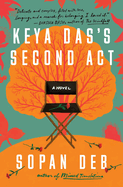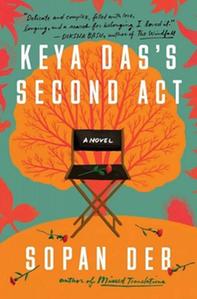
 New York Times journalist Sopan Deb wrote poignantly about family in his memoir, Missed Translations: Meeting the Immigrant Parents Who Raised Me. He turns to fiction in Keya Das's Second Act, further exploring how parents and children can become detached and, perhaps, discover new paths to lasting connections. As an Indian American with a New Jersey upbringing amidst familial challenges, Deb's empathic affinity ensures an exquisite first novel.
New York Times journalist Sopan Deb wrote poignantly about family in his memoir, Missed Translations: Meeting the Immigrant Parents Who Raised Me. He turns to fiction in Keya Das's Second Act, further exploring how parents and children can become detached and, perhaps, discover new paths to lasting connections. As an Indian American with a New Jersey upbringing amidst familial challenges, Deb's empathic affinity ensures an exquisite first novel.
Keya Das has been dead for five years. She was the younger of two daughters of an Indian American family in suburban New Jersey. She was just 18, had "the grades to go to Harvard" and "was so good in 42nd Street," her high school production. She was in love with best friend Pamela and had come out to her family. Her parents, Shantanu and Chaitali, reacted with words along the lines of "inappropriate." Shantanu declared, "This is a phase." Chaitali worried about others' opinions: "What will the other Bengalis say about us?" Keya's sister, Mitali, returned to college with barely a response. The month-long silence finally became too much. "We need to make sure that she knows we love her, first and foremost," Chaitali said. "We will tell her everything is okay," Shantanu added. But their remorse came too late; Keya was killed in a car accident.
The family splinters. Shantanu and Chaitali divorce. Chaitali marries someone else. Mitali moves to New York City and still has "her shields up," but she's recently downloaded dating apps, hoping to move forward. She accidently swipes right on Neesh and maybe they're a match. Meanwhile, Shantanu ponders selling the empty family house. Clearing the attic, he finds a wooden box filled with folded notes, clipped-together papers, things he was never meant to see. Some of Keya's most intimate memories are contained within. Those surviving words will be the miraculous impetus for, if not closure, then dramatic understanding for her left-behind loved ones.
Deb writes with effortless openness, even as he confronts what are certainly many of life's deepest tragedies: the loss of a child, the breaking of bonds, the betrayal of trust. He transfers his journalism prowess into clear, crisp sentences. His reporter's skills transform small but distinctive details into presenting an impressive cast of indelible characters (grieving Shantanu subsists on Froot Loops procured always on Friday shopping days, he borrows cologne from a neighbor hoping to "smell like something that isn't a mid-life crisis"). Insightful, resonating, surprisingly funny, Deb's own second act could earn him a standing ovation. --Terry Hong, Smithsonian BookDragon
Shelf Talker: A New York Times writer deftly transfers his reporter's prowess into an exquisite first novel featuring an Indian American family dealing with the loss of their youngest child.

